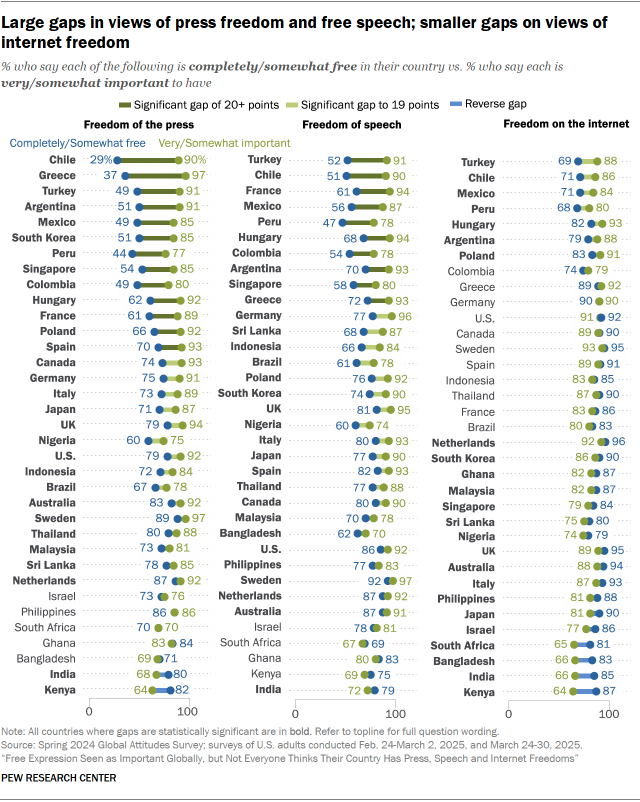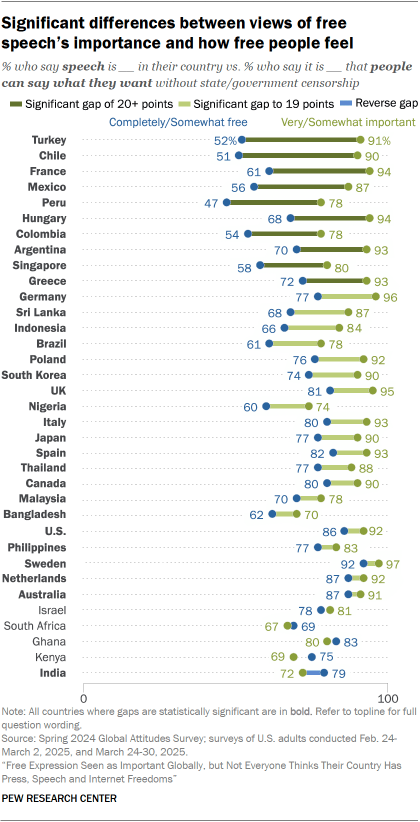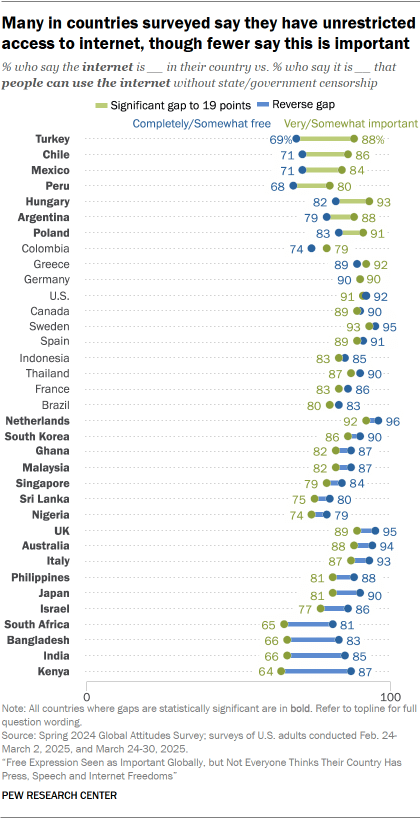One way to evaluate how people around the world feel about free speech, free press, and internet use without state or government censorship is to compare views of how important these freedoms are with perceptions of freedom in each country.
When making this comparison, we observe what we call “freedom gaps,” or differences between the shares of people who say that free press, speech and internet use are important and the shares who say that these activities are actually free in their country.
In many of the 35 countries surveyed, we see gaps in views of media freedom and freedom of speech – that is, the shares who say these freedoms are important are larger than the shares who say people in their country actually enjoy these freedoms.
But the picture is much less clear when it comes to freedom on the internet. In fact, we see “reverse gaps” in many countries, where more people say they can use the internet freely than say freedom on the internet is important.

Press freedom gaps

There are significant gaps on press freedom in 30 of 35 countries surveyed. In almost all of these cases, the gaps occur because a larger share of people say freedom of the press is important than say media in their country are actually free.
The largest press freedom gap is in Chile, where 90% of adults say that the media reporting the news without state or government interference is very or somewhat important, while only 29% say that the media in their country are completely or somewhat free to report the news. In other words, the share of Chileans who say a free press is important is approximately triple the share who say their media are indeed free.
Large gaps can also be found in Argentina, Colombia, Greece, Hungary, Mexico, Peru, Singapore, South Korea and Turkey. In several of these countries, views are split on whether media reporting is free. In both Chile and Greece, only about a third of adults or fewer rate their media as completely or somewhat free.
Among Americans, 92% say freedom of the press is important, compared with 79% who say the U.S. press are completely or somewhat free to report the news.
In India and Kenya, the gaps are reversed: Eight-in-ten adults or more in each country say their press are free to report the news, while around two-thirds say it is important to have press freedom.
Press freedom gaps are insignificant in Bangladesh, Ghana, Israel, the Philippines and South Africa. In other words, there is not a difference between views of media freedom’s importance and perceptions of an uncensored press.
Speech freedom gaps

Of the 35 countries surveyed, there is a significant speech freedom gap in 31 countries. In 30 of them, the gaps are due to larger shares saying free speech is important than saying they are actually free to say what they want.
For the most part, the free speech gaps look similar to press freedom gaps. The largest gap among the countries surveyed is in Turkey, where 91% say people expressing themselves without government or state interference is very or somewhat important, while 52% say people in Turkey are completely or somewhat free to do this.
Free speech gaps are particularly large in the Latin American countries surveyed. For instance, in Peru, approximately eight-in-ten adults say free speech is important, but only about half (47%) say Peruvians enjoy this freedom. Similarly, in both Chile and Mexico, large majorities agree that free speech is important. But Chileans and Mexicans are about evenly divided on whether people can say what they want without censorship in their respective countries.
In the U.S., more people say freedom of speech is important to have (92%) than say they are able to speak freely (86%).
In India, a slightly larger share say they have free speech than think this is important, resulting in a reverse gap. And publics in Ghana, Israel, Kenya and South Africa do not feel differently about the importance of free speech and their experiences with free speech.
Internet freedom gaps

Globally, internet freedom gaps are less pronounced than gaps on the other two freedoms we asked about.
Overwhelming majorities in most countries say it is important for people to be able to use the internet without censorship, and similar shares say they are able to use the internet freely where they live.
But because of high levels of people saying they have internet freedom, there are reverse freedom gaps in 17 countries. In these cases, larger shares of adults say that the internet is free of censorship in their country than say freedom on the internet is important to have.
For example, in the middle-income countries of Bangladesh, India, Kenya and South Africa, at least eight-in-ten adults say they are completely or somewhat free to use the internet – but only about two-thirds say this freedom is very or somewhat important to have.
But these reverse gaps are not limited to middle-income countries. In Australia, Israel, Italy, Japan, the Netherlands, Singapore, South Korea and the UK – all high-income countries – the shares who say they are free to use the internet are larger than the shares who believe internet freedom is important.
In seven countries, internet freedom gaps look similar to the speech and press freedom gaps. In other words, more people in these countries say that freedom on the internet is important than say they are able to use the internet freely.
As for the U.S., similar shares of Americans say that freedom on the internet is very important to have in their country and that people in the U.S. are completely free to use the internet without government censorship (91% vs. 92%).




